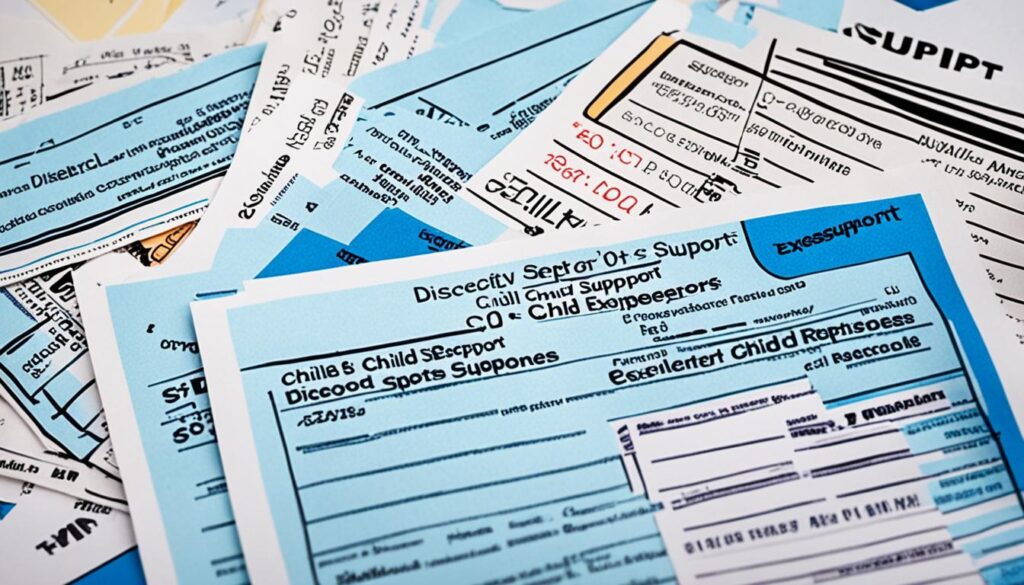Being a parent means dealing with child support cover. It might seem like a big puzzle. What does it cover? How is the amount set? In cases of divorce or separation with kids under 21, child support is key. The court makes sure this support is in place. But what does it really include? Let’s take a deep dive into child support to understand more.
Key Takeaways
- The basic child support obligation looks after a child’s key needs – like food, shelter, and clothes.
- Extra costs, like health care or child care, might also get covered in the child support payments.
- When figuring out the child support amount, the court uses a formula. It looks at what both parents earn.
- Parents might set a different child support amount on their own. But the court can change this if it thinks the child’s needs are not being met.
- Usually, the parent who doesn’t live with the child pays the basic child support obligation to the other parent.
Understanding Child Support Obligations
Child support is when parents help pay for their child’s needs. This is true even if the parents were never married. Unmarried parents and those who are or used to be married have to do this. It’s a legal duty to support their kids, period.
In some places like New York, you don’t need to have been married to get child support. If the parents were never married, the court checks if the father is really the child’s dad first. Then, the court figures out the child support obligations.
Legal Basis for Child Support
The law says both the custodial and non-custodial parents must help provide for their children. It doesn’t matter if the parents are together or not. This is a big legal duty they have to meet.
Determining Custodial and Non-Custodial Parents
After a divorce or separation, the court picks one parent to be the custodial parent. The other is the non-custodial parent. The custodial parent lives with the child. The non-custodial parent pays child support to help out.
Calculating Basic Child Support
Finding the child support calculation means looking at the parents’ incomes. The court checks each one’s tax returns. They look for all earnings, including things like workers’ comp, disability, and social security.
The court may also decide a parent could make more money. This rule stops a parent from lowering their income on purpose. They can’t do this to pay less child support.
Deducting Allowable Expenses
After figuring out all incomes, the court looks at what can be taken off. This includes any alimony and the needs of other kids. These are needed deductions.
Applying State Guidelines and Percentages
Next, the court takes the final income figures. They use the state child support guidelines. These rules help figure out how much support a child needs based on family income and size.
This method helps the court come up with a fair child support calculation. It’s meant to make sure kids get what they need financially.
Additional Child Support Expenses
The basic child support covers food, clothing, and a place to live. But, there are more costs that count in child support. These include health insurance, non-reimbursed health costs, and care for the child.
Health Insurance Costs
Every child should have health insurance. It’s an important part of child support. The parents pay for insurance based on how much they earn.
Unreimbursed Medical Expenses
If the child has any health costs not paid by insurance, both parents help cover these costs. They pay based on their earnings. This way, the child gets the care they need.
Child Care Costs
If one parent works or goes to school, child care is needed. It helps the parent work or study. The non-custodial parent helps pay for this child care.
These extra child support costs ensure the child’s well-being. They go beyond the basics. This support means the child has a good life, even if their parents are apart.
Considering Discretionary Add-On Expenses
The court may add more items beyond basic child support. These extras include educational, extracurricular, and summer activities for a well-rounded kid.
Educational Expenses
Special educational costs may be added by the court. This covers things like private school tuition. Such educational expenses give kids more learning chances.
Extracurricular Activities
Doing extracurricular activities helps kids grow. The court might include costs for sports, music, or community programs in child support.
Summer Camps and Programs
Summer activities, like camps, are also considered. They give children fun and chances to grow during the summer.

These extra costs aren’t always a must, but the court can add them if needed. This way, children can get support that fits their educational and fun needs better.
Deviations from State Guidelines
The court often uses state rules to figure out child support amounts. Sometimes, they don’t stick to these rules. This can happen if paying basic child support would make the non-custodial parent have less than $17,226 to live on. Other reasons include some special things about the non-custodial parent’s situation.
Factors Influencing Deviations
The court can look at many things to decide if they should change the child support rules. They look at how much the kids need, what money the parents have, and if there are any good reasons to not follow the normal rules.
Parental Agreements and Court Approvals
Sometimes, parents agree to a child support amount that’s different from the state rules. But, the court checks this agreement to make sure the child is still taken care of well. They make sure the amount is okay for the child and has a good reason to not follow the usual rules.
Child Support Enforcement and Modification
Parents must pay their ordered child support. Not paying can lead to big problems. This includes taking money from paychecks or tax refunds and losing the right to drive or work. Jail time is also a possibility. All of this is to make sure kids get the money they need.
But, if things change and you can’t pay as much, there is a way to fix it. This is called modifying your child support. You can ask the court to look at your situation again. They might lower how much you have to pay if things are very different now.
Know your rights if you’re struggling with child support. Or if you need to change the amount you pay. Getting help from a lawyer is a smart move. They can guide you through what can be a tough process. This way, you can make sure you’re doing what you need to for your kids.
What Does Child Support Cover?
Child support makes sure kids have all they need. This means things like food, shelter, and clothing. It helps with basic costs to give kids a good and healthy start.
Medical and Health Care Expenses
Medical and health care expenses are also part of child support. It covers expenses like health insurance and doctor visits. This part is key for the child’s health.
Child Care Costs for Working Parents
Child care costs are a big part for working or school-going parents. It covers expenses for daycare and after-school programs. This helps the parent keep their job and care for the child.
Handling Shared Custody Arrangements
Dealing with shared custody child support is tricky for courts. If parents equally share taking care of their child, it’s hard to figure out who should pay support.
Courts might say the richer parent needs to help the other financially. This ensures the child gets what they need, even if both parents cover expenses differently.
Remember, having shared custody doesn’t always mean no child support. The court must ensure the child’s needs come first. They look closely at what each parent makes and what the child costs to decide who pays how much.
Sometimes, the court changes how much support someone has to pay. This happens if splitting time equally is too hard on one parent’s wallet. But, it’s always about what’s best for the child.
Imputing Income for Child Support Calculations
When courts talk about child support, they can make a parent’s income look higher than it really is. This stops parents from trying to pay less by earning less on purpose. So, when working out child support, courts focus on what a parent could make, not just what they do make now.
Courts might decide a parent could earn more if they are choosing not to work as much. Or, if they used to earn more, or have skills that could bring in more money. This way, the court makes sure the kid gets what they need, and that the support payment is fair, based on what the parent could really be making.
Deciding a parent’s supposed income for child support can change from state to state. But, courts will look at things like the parent’s job history, what they are capable of, job options near them, and if they are trying to earn less. Then, the court decides on a number that should be used for the child support calculation.
Deciding what a parent could make for child support can be tricky. It means making a guess on what the parent might really make. Chatting with a lawyer who knows about child support can help make sure everyone is playing fair. They can help check the court’s guess on income is right.
Accounting for Additional Children and Relationships
The court looks at child support with care. It thinks about not just the children in the case now, but also any additional children the non-custodial parent has. It checks on “the needs of the children of the non-custodial parent (children not in this case) when setting child support.” This is key when deciding to stick to the common rules or make a change.
When a parent has new relationships and children, money can be tight. The court must be fair, making sure every child’s needs are met. This is how they find a fair solution for all.
Looking at a parent’s broader family duties is crucial. The system aims to support all children well, no matter how complex a parent’s life is. This method cares for the kids and understands the hardships parents might go through.

Tax Considerations in Child Support
Child support has big impacts on taxes for both parents. The court looks at tax consequences to the parties when figuring out child support. This is a big part of the decision.
Tax considerations child support include tax deductions and other benefits. If you get money for child support, you may need to pay taxes on it. But, the one sending the support might be able to lower their taxes by that amount.
Taxes get even trickier with child support if custody is not clear. This is when deciding who can get the tax breaks can be hard. It sometimes changes depending on the situation.
It’s important for parents to get how child support affects taxes. Talking to a tax expert or a lawyer who knows child support can help. They can guide you to make smart choices about your child support and taxes.
Co-Parenting and Communication Strategies
Good co-parenting and talking clearly are key for dealing with child support. It’s important for us, as parents, to put our kids’ needs first. This is true, even with complex laws and money matters to figure out.
Having open and honest talks makes co-parenting work well. We should check in regularly, by meeting, calling, or using an app. This is to talk about child support and any issues that might come up. Talking often and openly helps so we can solve problems together.
Creating co-parenting plans focused on our kids helps a lot too. This can be a shared calendar, regular routines, and big decisions made together. Working as a team gives our children a stable and supportive environment.
Good co-parenting is all about being flexible and ready to meet halfway. Showing understanding, being respectful, and caring about our kids’ happiness is what matters most. This way, dealing with child support doesn’t have to be hard. It can even build more trust and working together.

Child Support and Public Assistance
Understanding how child support public assistance works is key. If a parent gets child support government benefits, that money isn’t counted in their total income for child support. This info comes from the second source about child support under the CSSA.
Public help like welfare or food stamps doesn’t count towards a parent’s money. The court looks at what parents earn. It doesn’t focus on extra money from the government.
Leaving out public aid in child support sums helps families get the help they need. This way, families can use both child support public assistance and the support they are supposed to get. It’s like building a stronger safety net for kids with parent facing money problems.
| Factors Considered in Child Support Calculations | Inclusion of Public Assistance Benefits |
|---|---|
| Parental income from employment, investments, and other sources | Included in gross income |
| Public assistance benefits (e.g., welfare, food stamps, Medicaid) | Excluded from gross income |
| Mandatory expenses (e.g., health insurance, child care) | Included in calculation |
| Discretionary expenses (e.g., education, extracurricular activities) | May be included at the court’s discretion |
Knowing the rules about child support public assistance in child support cases is helpful. It lets parents deal with the law and finances better. This makes sure kids get what they need, even if their families use government help.
Seeking Legal Assistance for Child Support Issues
Finding legal assistance for child support can seem hard. There are many laws to understand, which isn’t easy for most parents. If you’re a parent who needs to change child support, talking to a child support lawyer is very helpful.
They will tell you everything you need to know about your state’s laws. They make sure child support numbers are right and fair. Plus, they help in court, if needed. They can also take action if the other parent isn’t paying.
Talking to a skilled child support lawyer might save you from big legal fights. They work for you, talk on your behalf, and help you follow the law. Their goal is to get the best for your family.
Don’t wait if you need help with child support. The right legal advice can protect you and make sure your child is looked after. Making your child’s financial care a top concern is what they do.
Conclusion
Child support is very important, no matter if the parents are together or not. It helps with a child’s basic needs like food and clothes. But it also covers other things like healthcare and activities.
We looked into how to figure out child support. This involves parent’s earnings, where the child lives, and more. Getting help from a lawyer can make things smoother. They can also help with government support if needed.
The main aim of child support is the child’s well-being. Knowing child support details helps families work better together. It’s good for both parents and their children.
FAQ
What is the legal basis for child support?
When a child is under 21 and parents divorce or separate, child support gets decided. The court uses a formula based on the parents’ incomes.
How is child support calculated?
The court needs to know the parents’ incomes. This includes all income reported on the latest federal tax returns. If a parent can earn more but doesn’t, the court can even add that to their income.
What does the basic child support obligation cover?
Child support covers essential needs like food, clothes, and a place to live. It also helps with other basic costs for the child.
What are the mandatory add-on expenses for child support?
Extra costs include the child’s health insurance, medical costs the insurance doesn’t cover, and part of child care if a parent is working.
Can the court include discretionary expenses in the child support calculation?
Yes, the court might also add expenses for things like school, religious education, and activities not covered in the essential needs list.
When can the court deviate from the standard child support guidelines?
The court might reduce payments if a parent can’t afford the set amount. This could be because they need money to make a living too.
How is child support handled in shared or joint custody arrangements?
Figuring out child support can be tough when both parents equally take care of the child. The court may still say the parent with the higher income needs to pay more.
Can the court impute income for child support purposes?
The court can estimate a parent’s income for child support. This stops parents from lowering their income to pay less.
How are additional children and new relationships considered in child support?
The court looks at all children’s needs, not just ones from this case. This helps decide if the set child support needs to change.
Are there any tax considerations in child support?
Taxes could play a role in how much child support you might have to pay or get. The court will consider how taxes affect both parents.
How is child support handled when a parent is receiving public assistance?
Public assistance money isn’t counted as income for child support calculations. This is under the CSSA rules.
When should I seek legal assistance for child support issues?
A: Legal assistance should be considered if you have detailed issues. This FAQ doesn’t guide on personal legal advice timing.








